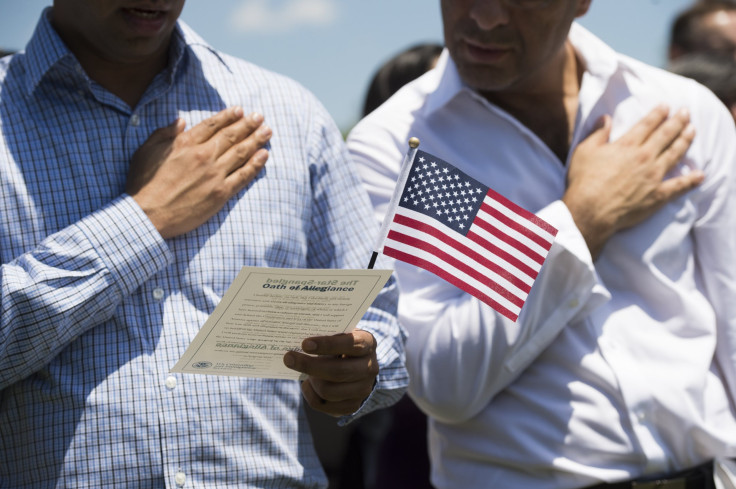Compulsory To Stand For Pledge Of Allegiance? Texas Student Expelled For Refusing

A federal lawsuit has said the constitutional rights of a 17-year-old student from Houston, Texas, were violated when she was expelled from school last week for refusing to stand for the daily Pledge of Allegiance, reports said Sunday.
The lawsuit was filed Saturday against the Cypress-Fairbanks Independent School District and a high school principal, Randall Kallinen — an attorney for 17-year-old India Landry's family — said.
The lawsuit claimed Landry, who'd been sitting for the pledge in class at the school without incident earlier, had been expelled last week on Monday. It also charged that Landry was told immediately after she was expelled that "if your mom does not get here in five minutes the police are coming."
Further, the lawsuit also specified Landry was allowed to return to school Friday after the principal reversed course and said Landry could sit during the pledge. "I was actually terrified, I see what's going on with the country," the student's mother Kizzy told the New York Daily News on Saturday. "That scared the hell out of me. I thought let me hurry up and get to my baby before something happens to her."
Landry told CBS affiliate KHOU she did not think "the flag is what it says it's for, for liberty and justice and all that,” and so she preferred to sit during the pledge and would continue to do so. The school district said in a statement that no student would be removed or expelled from campus for not standing during the pledge and that this matter would be dealt internally, the Houston Chronicle reported.
"The Pledge of Allegiance to the Flag, 'I pledge allegiance to the Flag of the United States of America, and to the Republic for which it stands, one Nation under God, indivisible, with liberty and justice for all,' should be rendered by standing at attention facing the flag with the right hand over the heart. When not in uniform men should remove their headdress with their right hand and hold it at the left shoulder, the hand being over the heart. Persons in uniform should remain silent, face the flag, and render the military salute," the pledge reads, according to the U.S. constitution.
A 1943 Supreme Court case — West Virginia State Board of Education vs. Barnette — has been cited in the lawsuit where students were protected from being forced to recite the Pledge of Allegiance and salute the flag in public schools. In that case, the apex court ruled that forcing students to stand or recite the pledge constituted compelled speech and also violated the First Amendment.
Supreme Court struck down a resolution, which allowed students to be expelled, who refused to stand for the pledge on the basis that refusing to do that constituted an act of insubordination, according to Dinsmore, a law firm headquartered in Cincinnati, Ohio.
Thus, according to the guidelines in the Barnette case, it has been made clear that schools cannot force students to recite or stand for the Pledge of Allegiance (including standing silently while others recite the pledge).
Students also cannot be forced to stay in the room, while others recite, if they wish to leave. They are also not entitled to explain or justify themselves if they have chosen not to stand or not to recite the pledge.
Schools might also want to inform students that they are not entitled to attend the pledge and they can skip participating. If they do not wish to participate, teachers should not influence them to do so or lecture them about patriotism and respecting the flag.
"This is not legal," University of Houston Law Center assistant professor Emily Berman said referring to the incident that took place with Landry. "There are a lot of constitutional questions that raise difficult or ambiguous responses, but this is very clearly not legal."
"This is not right," Landry told the Houston Chronicle. "I don't want other children to be treated like this."
© Copyright IBTimes 2025. All rights reserved.






















